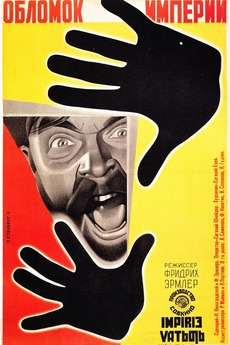
The series Red Century: Russian Revolution on Film continued on Wednesday, November 29, with Fragment of an Empire (Обломок империи, 1929) the last silent film by Fridrikh Ermler and the last silent film in the year-long program of screenings.
The film was introduced by Ana Berdiskikh, graduate student in the department of Slavic Languages and Literatures. In her short introduction, she gave the audience some insight into the plot of the film, as the copy provided courtesy of the Museum of Modern Art lacked intertitles. Berdinskikh also talked about the director, who was born into a poor Jewish family in what is now Latvia, became a member of the Communist Party in 1919 and even served in the Soviet secret police (Cheka) before his career in film. Ermler was the founder of the Experimental Cinema Workshop (KEM).
The protagonist of the film, Filimonov, is a shell-shocked soldier who lives at a small train station in the middle of nowhere and does not remember his past. The film starts with him saving a typhoid Red soldier and then cuts to 1928, when he suddenly sees a woman on the train the sight of whom brings back his memory. He remembers that he lived in Saint Petersburg and this woman was his wife. He decides to go back but does not recognize the city, now a skyline of monuments to Lenin and tall modern buildings. (In fact, most of the material was filmed in Kharkiv, so Filimonov is not so wrong in not recognizing his home city.) He ends up looking for a job at a factory and there meets the soldier he saved in the beginning of the film, who turns out to be of authority and takes Filimonov under his patronage. It does take him a while to get used to the new ways but his colleagues support him fully. He finds out that his wife, who thought him dead, has remarried a hypocritical cultural worker who advocates for gender equality but mistreats his wife. Filimonov proposes she left with him but she chooses to stay in a nicely furnished apartment with her new husband. Leaving, he calls them fragments of an empire.
Among many aspects of the film which the audience pointed out during the discussion, were the recurring Christian motifs, the problem of gender equality, the uncharacteristic for the 20s use of folk culture, and montage. Interesting parallels were drawn with Aelita, Yakov Protazanov’s film screened before as a part of the series: both pictures feature a woman who had to make a choice and both end with the same phrase—’There’s still a lot of work to do.’
Fragment of an Empire was accompanied by Donald Sosin, resident pianist for the Film Society of Lincoln Center, BAM, and the Museum of Moving Image. Sosin also worked as a resident film accompanist at the Museum of Modern Art. He composes music for silent films himself, and his work includes scores for The Cabinet of Dr. Caligari, Nosferatu, A Story of Floating Weeds, Blind Husbands, and many others.
Written by Mariia Muzdybaeva, a graduate student in European and Russian Studies Masters Program
The series Red Century: Russian Revolution on Film is sponsored by the Russian Studies Program at the European Studies Council at the MacMillan Center; Whitney Humanities Center; and the Edward J. and Dorothy Clarke Kempf Memorial Fund. For information on upcoming screenings, visit: http://europeanstudies.macmillan.yale.edu/calendar

